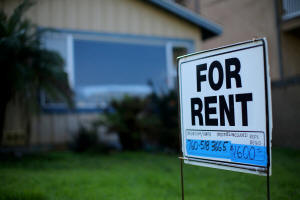Judge puts hold on ruling voiding U.S. moratorium on evicting renters
 Send a link to a friend
Send a link to a friend
 [May 06, 2021]
By Jonathan Stempel and David Shepardson [May 06, 2021]
By Jonathan Stempel and David Shepardson
WASHINGTON (Reuters) -A federal judge on
Wednesday threw out the U.S. Centers for Disease Control and
Prevention's nationwide moratorium on evictions but agreed to put a
temporary hold on her ruling as the government seeks to reverse the
decision on appeal.
U.S. District Judge Dabney Friedrich said that although there was "no
doubt" Congress intended to empower the CDC to combat COVID-19 through a
range of measures such as quarantines, a moratorium on residential
evictions was not among them. The ruling was a setback for millions of
Americans who have fallen behind on rent payments during the pandemic.
The Justice Department sought an emergency order to put Friedrichs's
decision on hold, arguing "evictions exacerbate the spread of COVID-19,
which has already killed more than half a million Americans, and the
harm to the public that would result from unchecked evictions cannot be
undone."
Friedrich agreed to temporarily put her ruling on hold and gave the
landlord groups that challenged the moratorium until May 12 to file
legal papers opposing the delay. She emphasized she had not ruled on the
merits of the government's request.

Friedrich's order gives the Justice Department four days to respond
after the landlord groups' file legal papers.
Friedrich cited the "plain language" of a law called the Public Health
Service Act, which governs the federal response to the spread of
communicable diseases, even while acknowledging that the pandemic is "a
serious public health crisis that has presented unprecedented challenges
for public health officials and the nation."
Evictions "exacerbate the spread of COVID-19," and the moratorium
"protects many renters who cannot make their monthly payments due to job
loss or healthcare expenses," Brian Boynton, acting assistant attorney
general for the department's civil division, said in a statement.
The White House has estimated that one in five renters were delinquent
on payments by January, while the CDC has said more than 4 million
adults who were behind feared imminent eviction.
Friedrich's decision benefits the many landlords struggling to pay their
own bills because they are unable to collect rent.
The CDC moratorium began last September and was scheduled to lapse on
June 30. Other courts have been divided over its legality, with some
also finding the CDC exceeded its authority. Friedrich, an appointee of
former President Donald Trump, was the first to formally block the
eviction ban.
At least 43 states and Washington, D.C., have also temporarily halted
residential or business evictions, though the protections are far from
uniform.
[to top of second column]
|

A "For Rent" sign is posted outside a residential home in Carlsbad,
California, U.S. on January 18, 2017. REUTERS/Mike Blake

Landlords and real estate groups that challenged the
moratorium in court said the CDC lacked the power to impose it, and
unlawfully took away their right to deal with delinquent tenants.
A separate eviction and foreclosure moratorium for
federally financed housing from the U.S. Department of Housing and
Urban Development is due to expire on June 30.
HEALTH MEASURE
The CDC began the moratorium during Trump's presidency and it was
extended three times, most recently in March under his successor Joe
Biden.
It covered renters who expected to earn less than $99,000 a year, or
$198,000 for joint filers, or who reported no income, or received
stimulus checks. Renters also had to swear they were doing their
best to make partial rent payments, and that evictions would likely
leave them homeless or force them into "shared" living quarters.
The National Association of Realtors welcomed Friedrich's decision,
saying programs to help tenants pay rent, taxes and utility bills
are preferable to the moratorium.
"With rental assistance secured, the economy strengthening and
unemployment rates falling, there is no need to continue a blanket,
nationwide eviction ban," the group said.
The group has estimated that 40 million Americans were behind on
rent in January, with $70 billion of missed payments by the end of
2020.
"We know eviction spreads COVID-19, we know it disrupts access to
healthcare and we know it's increasing health inequity among Black
and Latinx people," said Emily Benfer, a visiting law professor at
Wake Forest University and expert on evictions. "The moratorium
stops all of these harms."
Congress approved $25 billion of emergency rental assistance in
December and another $21.5 billion in March.
Diane Yentel, president of the National Low Income Housing Coalition
advocacy group, said the moratorium should stay in place at least
until the assistance provided by Congress "reaches the renters who
need it."
(Reporting by Jonathan Stempel and Michelle Conlin in New York, Tim
Ahmann, Steve Holland, Andrea Shalal and David Shepardson in
Washington and Tom Hals in Wilmington, Delaware; Editing by Will
Dunham and Gerry Doyle)
[© 2021 Thomson Reuters. All rights
reserved.] Copyright 2021 Reuters. All rights reserved. This material may not be published,
broadcast, rewritten or redistributed.
Thompson Reuters is solely responsible for this content. |